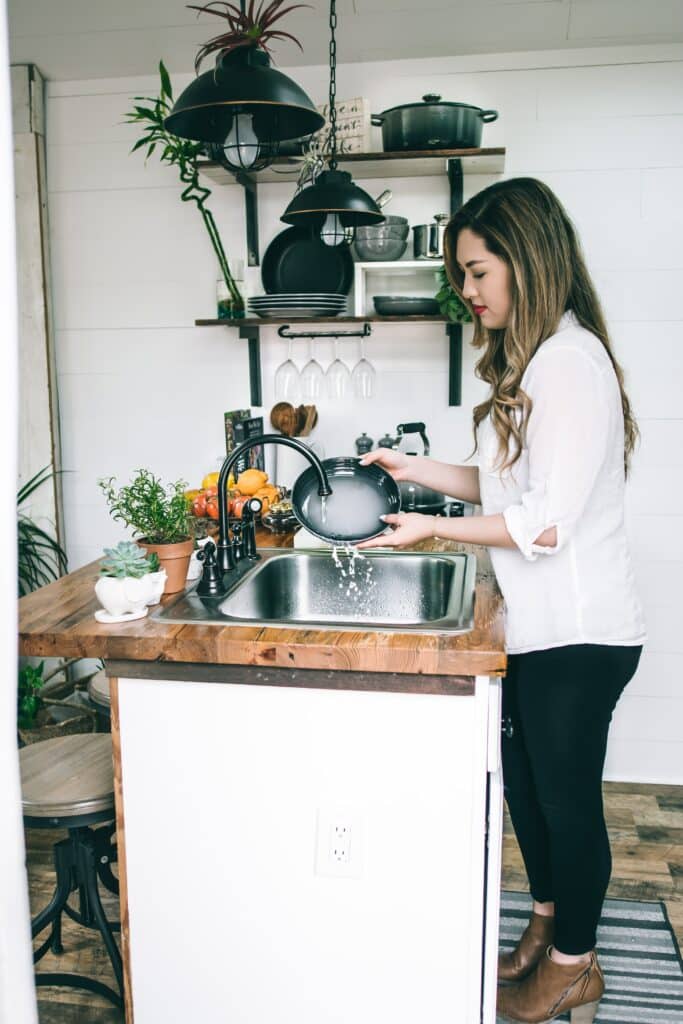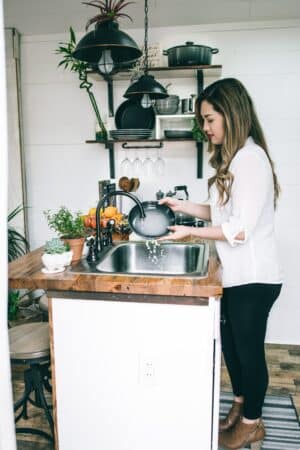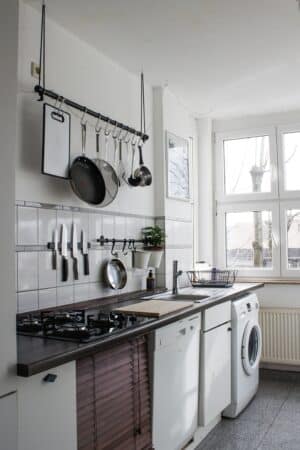8 Kitchen Hygiene Rules to Follow For a Healthier Home

If you're serious about food safety in your kitchen, following good hygiene practices is necessary. As is true with any area in the home, bacteria can easily build up and cause illnesses if left unchecked. If you're regularly cooking in your kitchen, dangerous pathogens such as E.coli, Salmonella and Listeria can quickly spread via food, utensils or surfaces if they aren't properly managed.
The Benefits of a Clean Kitchen
Having a clean kitchen is not only beneficial when it comes to preparing meals, but it also helps contribute to a healthier home. When gross kitchen habits such as leaving food out overnight or letting food go mouldy in the fridge are avoided, it helps to reduce the introduction and development of germs.
These germs can cause food poisoning, which can lead to unpleasant and sometimes serious illnesses. Ultimately, following good kitchen hygiene practices is the only way to ensure that your food is safe to eat and that the environment in your kitchen remains healthy for you and your family.

Rule #1: Keep Kitchen Surfaces Clean and Sanitised
Keeping your kitchen surfaces clean and sanitised is important to ensure your home's health. While a weekly wipe-down and polishing with a damp cloth are still necessary, they may not tackle all of the bad bacteria that can accumulate over time. A great way to keep on top of this is to use a household cleaner with disinfectant properties daily as part of your regular cleaning routine.
This can eliminate certain dangerous bacteria from surfaces, such as worktops and the kitchen splashback, without scrubbing with more abrasive products, which can damage surfaces. As well as protecting your and your family's health, sanitising the kitchen will help keep food fresh, saving money in the long run.
Rule #2: Separate Raw and Cooked Foods
Cooking meals at home can be healthier for your family than eating out, but there's more to healthy meal prep than just using fresh ingredients. Keeping raw and cooked foods separate is essential in avoiding food-borne illnesses that can lead to serious health issues. When shopping, put raw items in one bag and ready-to-eat items in another. When storing food, ensure enough space between the two food categories. This will prevent cross-contamination through contact or drips from raw items contaminating cooked ones.
Labelling stored items can also help keep track of what has been cooked and what is still raw. Following these simple habits at home will provide an extra level of safety when it comes to preparing quality meals for your family!
Rule #3: Disinfect Sponges and Towels Regularly
The cleanliness of your home is essential for a healthier lifestyle. That's why it's important to disinfect sponges and towels regularly. Sponge cleaning should occur daily due to the bacteria they absorb while cleaning dishes and surfaces in your kitchen. For even greater sanitation, microwave them damp for a couple of minutes at high heat. It's also just as important to frequently change out used dishrags and clothes, but regardless of how often you switch them out, it is wise to sanitise the used ones properly before laundering.
Bleach and white vinegar work well as a natural alternative if you prefer not to use chemical cleaners on your towels or dish rags; soak the items in either solution for up to 30 minutes and then wash thoroughly before letting them air dry. Regular hygiene practices like these can help make your house a much safer, healthier place for everyone there.
Rule #4: Store Food Properly
Keeping your food stored properly is an important part of a healthy diet. Storing fruits and vegetables in the refrigerator can help slow mould growth and preserve vitamins. Keeping dry goods like grains and beans sealed tightly in airtight containers can prevent contamination from outside sources.
Not only does proper food storage benefit your general health, but it can also save you money as fruits and vegetables that are kept fresh for longer periods don't have to be replaced as often. Properly stored food also cuts down on waste, reducing your impact on the environment. Investing in the right types of containers, bags, and wrapping materials is key to establishing healthier habits at home.
Rule #5: Clean Up Spills Immediately
Keeping your home clean is important to creating a safe and healthier space for your family. One way to do this is to ensure that spills are cleaned up immediately. This will help prevent bacteria, mould, and dust mites from growing around the house, which could lead to health issues if left unchecked. Taking the time to clean up spills immediately will help keep the air in your house fresher and more enjoyable for everyone.

Rule #6: Avoid Cross-Contamination of Foods from Different Sources
To prevent cross-contamination of food in the home, separating raw and cooked foods and storing them properly is important. Raw meats should be stored on the lowest shelves of the fridge to avoid possible dripping and contamination of other foods, while cooked or prepared foods should be stored on higher shelves. It is also a good idea to use two cutting boards, one for raw meats and the other for everything else. This will minimise exposure to infectious agents such as bacteria.
Tip: You can sanitise a chopping board more thoroughly by running it underneath a boiling water tap.
Additionally, ready-to-eat items should be stored at least six inches above uncooked products in a kitchen cabinet. These steps will help you create a safer environment and protect your family from illness or foodborne illnesses caused by contaminated food sources.
Rule #7: Wash Hands Before and After Preparing Food
Preparing food is essential to maintaining a healthy household, and one of the best ways to ensure that our pantries and kitchens remain clean is to wash our hands before and after cooking. The thought of preparing meals from food that dirty hands have touched can be unappealing, especially with all the germs that can spread through the food. Wash your hands for at least twenty seconds with warm water and soap before prepping any ingredients. This step ensures that no bacteria will be transferred during preparation.
After you finish working with the food, you must rewash your hands before handling other items. Doing so will help prevent cross-contamination and lessen the chances of passing the illness on to family members or anyone who might eat the meal you just prepared. Washing hands regularly prevents kitchen messiness and keeps everyone around us healthy.
Rule #8: Ensure Adequate Ventilation in the Kitchen Area
Ensuring proper ventilation in the kitchen area is essential to promoting a healthier home. Good kitchen ventilation helps reduce indoor air pollution by removing smoke, cooking odours, and other airborne contaminants. Not only does this improve indoor air quality, but it also helps to extend the life of various kitchen appliances like ovens, microwaves, and refrigerators. These machines can be damaged over time due to long exposure to certain pollutants found in the home.

To ensure adequate kitchen ventilation, homeowners should consider inspecting existing exhaust fans or installing new ones if necessary. Additionally, they may want to invest in a range hood with high-quality filters that can effectively remove dust particles from the air in addition to smoke and other odours. Homeowners can keep their kitchens safe and healthy for years by taking these simple steps.
Conclusion
Keeping a clean and hygienic kitchen is essential for health and safety. Following the eight hygiene rules in this article will help homeowners maintain healthy kitchens and keep their families safe from harm. From ensuring that raw food is stored separately to investing in proper ventilation, following these simple steps can ensure you have a safe, germ-free space to prepare meals.
Lastly, remember that a clean kitchen is the best way to protect yourself and your family from foodborne illnesses and other dangerous contaminants.
Our boiling water taps are ideal for sanitising and cleaning. Boiling water is the ultimate hygienic measure, killing bacteria and germs without having to use harsh chemicals.
